
A comprehensive guide to Russian-language instruction combining the latest research, pedagogy, and practice.
The Art of Teaching Russian offers practitioners current research, pedagogical thinking, and specific methodologies for teaching the Russian language and culture in the twenty-first century. With contributions from the leading professionals in the field, this collection covers the most important aspects of teaching the Russian language.
The book begins with an overview of the past and current trends in foreign language education and in Russian instruction in the United States. Other topics include the effects of ACTFL's World-Readiness Standards on the field; different pedagogical approaches to teaching at various levels of proficiency; curriculum and materials development; and teaching Russian culture to develop students' intercultural competence. The collection concludes with a discussion on how to use technology in the Russian-language classroom to enhance students' learning.
The Art of Teaching Russian includes practical approaches for successful teaching, supported by original research. Teachers and graduate students will rely upon this collection to enhance their instruction.
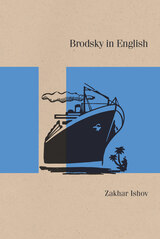
Joseph Brodsky’s translations of his own Russian-language poems into English “new originals” have been criticized for their “un-Englishness,” an appraisal based on a narrow understanding of translation itself. With this radical reassessment of the Nobel Prize winner’s self-translations, Zakhar Ishov proposes a fresh approach to poetry translation and challenges the assumption that poetic form is untranslatable.
Brodsky in English draws on previously unexamined archival materials, including drafts and correspondence with translators and publishers, to trace the arc of Brodsky’s experience with the English language. Ishov shows how Brodsky’s belief in the intellectual continuity between his former life in the Soviet Union and his new career in the United States, including as Poet Laureate, anchored his insistence on maintaining the formal architecture of his poems in translation, locating the transmission of poetic meaning in the rhythms of language itself. This book highlights Brodsky’s place within the long history of the compromises translation must make between linguistic material and poetic process.
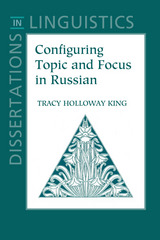
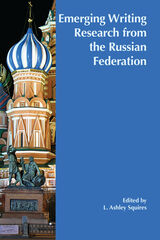
This book is also available as an open access ebook through the WAC Clearinghouse.

A highly communicative approach to Intermediate Russian grounded in everyday culture and authentic texts
Etazhi uses the communicative approach to advance student’s Russian proficiency from the Novice High / Intermediate Low level of the ACTFL scale to an Intermediate Mid / Intermediate High level. Designed for one academic year of instruction, Etazhi engages students with highly relevant topics to internalize new vocabulary, expand their grammatical reach, and deepen their cultural understanding of Russian speakers.
Chapters on Russian daily life, travel, dating and marriage, clothing, cuisine, health and medicine, education, holiday traditions, and careers are infused with humor and help students acquire the vocabulary and cultural nuance needed to discuss Russian literature, culture, and the arts. Hundreds of authentic texts, photographs, and illustrations gathered from across the Russian Federation–including authentic material written by real people about their experiences in Russia–show the diversity of Russian speakers, culture, and society. Each of the six chapters contains approximately fifty exercises that help students practice the four basic language skills–listening, speaking, reading, and writing.
This textbook improves vocabulary and grammar while promoting deeper cultural competency, preparing students to study abroad, and providing a firm foundation for advanced courses.
Special features include:
- Audio transcripts to aid in comprehension checks (available for free on the Press's website)
- A grammar reference with charts and tables, including case and verb charts
- An extensive Russian-English glossary
- Over 120 authentic photographs and hand-drawn images by a Russian artist
- A sample of presentation materials and a sample exam for chapter one to aid instructors (available for free on the Press's website)

eTextbooks are now available to purchase or rent through VitalSource.com! Please visit VitalSource for more information on pricing and availability.
Faces of Contemporary Russia is a one-semester textbook for high-intermediate to advanced level Russian students that aims to develop students' linguistic proficiency by examining significant personalities in current Russian culture. In addition to introductory and concluding chapters, the book features twelve individuals (one per chapter), drawing from a range of areas such as arts, sports, journalism, and business. While upper-level Russian textbooks tend to emphasize grammar and reading more traditional works of Russian literature, this book instead seeks to primarily engage students in learning about and discussing the breadth of contemporary Russian culture while weaving the study of grammar and vocabulary into those discussions. In addition to readings and in-class communicative activities, the book also features guided research assignments that encourage students to make use of the many personality interviews and YouTube clips available online.
For Instructors: Exam copies of the textbook are available free of charge to instructors and can be ordered on this page. To request a print sample, please use the "print" exam copy button. To request a digital sample, instructors should log onto VitalSource.com, select "Faculty Sampling" in the upper right-hand corner, and select the desired product.
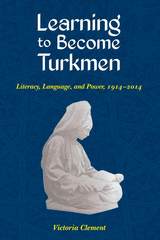
Complemented by extensive fieldwork, Learning to Become Turkmen is the first book in a Western language to draw on Turkmen archives, as it explores how Eurasia has been shaped historically. Revealing particular ways that Central Asians relate to the rest of the world, this study traces how Turkmen consciously used language and pedagogy to position themselves within global communities such as the Russian/Soviet Empire, the Turkic cultural continuum, and the greater Muslim world.
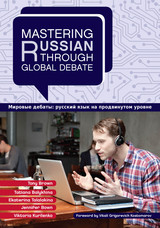
eTextbooks are now available through VitalSource.com!
Mastering Russian through Global Debate brings together the rhetorical traditions of the communications field and the best practices of adult second-language instruction to facilitate Superior-level proficiency in the Russian language. Each chapter addresses a rich topic of debate, providing students with a set of prereading activities, texts covering both sides of a debate topic, and continues with postreading comprehension and lexical development exercises—all of which foster the language and critical thinking skills needed for successful debates. A rhetorical methods section in each chapter integrates language and practice and prepares students for end-of-chapter debates. Using debate to develop advanced competency in a second language is a method that is finding increased interest among instructors and students alike, in both synchronous online teaching and the individual classroom. Students are prepared to participate fully in debates with their classmates—at home, abroad, or both.

Stressing the fundamental structural features of contemporary spoken Russian, these eighteen audio-lingual lessons primarily employ imitation and repetition exercises. Also included are reading selections, a pronunciation guide, a Russian-English vocabulary, and an index—all keyed to the first-year studies of a two-year speaking proficiency program.

E-Textbooks are now available to purchase or rent through VitalSource.com! Please visit VitalSource for more information on pricing and availability.
As of January 1, 2021, Smart Sparrow Companion Websites are no longer available for any of our textbook programs. New companion websites are coming soon, and will be hosted by Lingco. Instructors may sample the new companion websites now by visiting GUPTextbooks.com/companionwebsites. The full websites will be available for fall 2021 course adoption.
Until the new companion websites become available, eBook Workbooks with exercises from the Smart Sparrow Electronic Workbook are available for purchase on the GUP website and VitalSource.com, as are Workbook Answer Keys. They will both be sold in eBook format only.
Panorama moves intermediate-level students of Russian toward advanced proficiency by engaging them in a systematic and comprehensive approach to Russian grammar with texts from a variety of genres, including proverbs and sayings to immerse students in Russian culture.
By reading and listening to Russian literary classics and contemporary nonfiction texts, students develop a contextual understanding of Russian culture and forms of expression that grow their command of vocabulary, grammar, and complex syntax. The textbook includes comprehensive in-class vocabulary and grammar exercises and discussion topics as well as reading texts (for work in class and at home), summative oral and written exercises, and compelling color photos.
An additional eBook Workbook (sold separately) includes essential homework exercises to practice vocabulary, grammar, listening, and speaking. eBook Workbook Answer Keys are also available for purchase for instructor use, or for students to check their own work.
Features of Panorama:
• Content can be used in one semester/two terms or for a full year• Modular structure allows instructors flexibility to assign chapters in their own sequence• Authentic photojournalist photos to prompt discussion exercises for each chapter topic• Summative exercises for each chapter test student mastery of the grammar topics, vocabulary, and cultural competence related to the chapter theme in a written essay format• Most grammar examples and exercises are drawn from the Russian National Corpus• Readings include blogs, blog comments, articles, and interviews, exposing students to current Russian culture and language. • Audio needed for completing homework exercises is available for free at www.press.georgetown.edu
For Teachers:
Exam copies of the textbook, Workbook, and Workbook Answer Keys are available free of charge to instructors and must be requested separately. Textbook exam copies can be ordered on this page. To request digital exam copies of the Workbook and Workbook Answer Keys, please visit the pages for each of those products, or visit VitalSource.com.
A free online Teachers Manual is also available and features supplementary activities and texts, including ideas for group activities, research projects, songs and video clips for each chapter, audio files of native speakers reading the literary classics from each chapter, and guidance to create a syllabus and exam, with a sample syllabus and sample chapter test. Available at www.press.georgetown.edu.

An advanced, student-centered textbook that uses popular media to explore diverse perspectives from across Russian-speaking cultures
Pro-dvizhenie is a student-centered, inquiry-based textbook designed to build Advanced-level Russian proficiency through engagement with timely topics that encourage reflection and examination. Whether exploring the role of technology in relationships, learning about indigenous communities of Russia, or reflecting on what it means to live well, Pro-dvizhenie uses popular Russian film, TV, and media as a springboard for various types of activities, including skill-building exercises, essay writing, and group projects. Students are encouraged to challenge assumptions and make intercultural connections throughout while developing ACTFL Advanced-level skills such as argumentation, narration, and collaboration.
Students benefit from extensive activities and resources, including audio and video of diverse voices and viewpoints from across Russia, available to stream on the Press website. A full-service textbook for instructors, Pro-dvizhenie includes extensive online instructors’ resources, such as additional grammar and vocabulary assignments, writing and group project prompts, grading rubrics, and answer keys. A modular structure and activities at various levels of difficulty give instructors the flexibility to select material in the book based on their class’s needs, making Pro-dvizhenie perfectly suited for mixed-level classrooms. The textbook can be used over one semester or over the course of a full year.

E-Textbooks are now available to purchase or rent through VitalSource.com! Please visit VitalSource for more information on pricing and availability.
As of January 1, 2021, Smart Sparrow Companion Websites are no longer available for any of our textbook programs. New companion websites are coming soon, and will be hosted by Lingco. When it becomes available, instructors may sample the new companion websites by visiting GUPTextbooks.com/companionwebsites. The full websites will be available for fall 2021 course adoption.
Until the new companion websites become available, eBook Workbooks with exercises from the Smart Sparrow Electronic Workbook are available for purchase on the GUP website and VitalSource.com, as are Workbook Answer Keys. They will both be sold in eBook format only.
Rodnaya rech', an introductory textbook for heritage learners, addresses the unique needs of students who have at least intermediate-level listening and speaking skills on the ACTFL scale but who have underdeveloped or nonexistent literacy skills. With an emphasis on conceptual understanding of vocabulary and grammar, Rodnaya rech' builds students' literacy skills and teaches them to strategically use the linguistic intuition they have gained as heritage speakers while strengthening all four skill areas.
Essential to learning with Rodnaya rech’ is the workbook, which includes all of the homework activities and texts for reading comprehension (sold separately). These practice activities allow students to practice what they are learning in the textbook.
With this textbook designed for in-class work and the accompanying workbook, Rodnaya rech' can be used as the main course material either in an intensive one-semester class or at a more measured pace over two semesters. This book is flexible enough to be used in specialized heritage or in mixed classes. It can also support independent study and learning in less formal settings, such as community schools.
For Teachers:
Exam copies of the textbook are available free of charge to instructors and can be ordered on this page. To request a print sample, please use the "print" exam copy button. To request a digital sample, instructors should log onto VitalSource.com, select "Faculty Sampling" in the upper right-hand corner, and select the desired products.
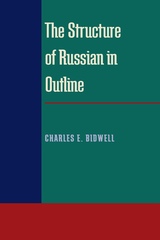
Bidwell offers an original phonemic analysis and, breaking with traditional grammars, treats the language as primarily and basically a spoken phenomenon with the grammatical description based solidly on the spoken forms. Divided into three sections, focusing on the phonemics, morphology, and syntax, The Structure of Russian in Outline aims to give a coherent and concise account of the sounds, forms, and constructions of the Russian language, treating the whole as an integrated system structured on hierarchical levels.
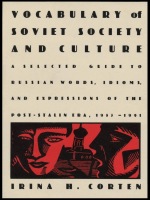
The entries are listed alphabetically in English transliteration followed by the Cyrillic, although readers familiar with Russian may prefer to use the Cyrillic alphabet listing included in this volume. In each entry, the author provides a succinct but full explanation of the term and, whenever possible, cross-references to other entries, authentic examples of its use, and samples of relevant Soviet jokes. A reader may approach the lexicon either sequentially or with the aid of a subject thesaurus that divides the material into specific topics. A listing of complementary sources of reference appears in a useful bibliography.
With this fascinating lexicon of "Sovietisms," Corten provides an invaluable and easily accessible medium for those general readers and scholars of the Russian language and Soviet culture interested in understanding contemporary Soviet life.
Selected entries from the Vocabulary of Soviet Society and Culture
Anekdótchik (anekdótchitsa) (cyrillic spelling) (n.)
1: A person who tells jokes (anekdoty); 2: coll. since the late Stalin era, a person arrested and given a prison sentence for the telling of political jokes. The phenomenon indicates the important role of the political joke in Soviet culture and, specifically, in the dissident movement. See iazychnik; sident.
The following jokes were popular during the Brezhnev era:
1. "Comrade Brezhnev, what is your hobby?"
"Collecting jokes about myself."
"And how many have you collected so far?"
"Two and a half labor camps."
2. Question: What is a marked-down joke?
Answer: A joke which, under Stalin, got you ten years in a labor camp, and now gets you only five.
egoístiki (cyrillic) (n.; pl.). Lit., little egotists; coll. since the 1970s referring to headsets worn by music lovers, especially teenage fans of rock music. The idea is that, by wearing headsets, one shuts out the world and becomes indifferent to everything except oneself.
zhrál'nia (cyrillic) (n.). Der. zhrat', to gorge, devour (vulg.); coll. since the 1970s denoting an eating establishment with inexpensive and often bad-tasting food. In the late 1980s, the term also has been applied to new fast-food restaurants which have been built in Soviet cities by Western concerns, for example, McDonald's. See amerikanka; stekliashka; stoiachka.
READERS
Browse our collection.
PUBLISHERS
See BiblioVault's publisher services.
STUDENT SERVICES
Files for college accessibility offices.
UChicago Accessibility Resources
home | accessibility | search | about | contact us
BiblioVault ® 2001 - 2024
The University of Chicago Press









